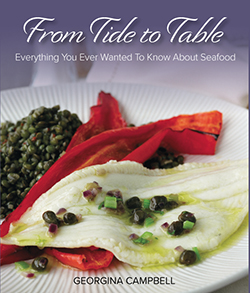Grow It Yourself - May
 There is a wonderful Ted Talk by New York-based chef Dan Barbour about a small farm in Spain that produces foie gras humanely (without the force feeding that the product is often lambasted for). Raising his geese in a natural environment, farmer Eduardo Sousa re-discovered that if geese are allowed to forage at will, they will naturally gorge themselves in the autumn to build up fat for the winter. The result? A ‘natural’ foie gras. The important word there is “re-discovered” because there is nothing new in this.
There is a wonderful Ted Talk by New York-based chef Dan Barbour about a small farm in Spain that produces foie gras humanely (without the force feeding that the product is often lambasted for). Raising his geese in a natural environment, farmer Eduardo Sousa re-discovered that if geese are allowed to forage at will, they will naturally gorge themselves in the autumn to build up fat for the winter. The result? A ‘natural’ foie gras. The important word there is “re-discovered” because there is nothing new in this.
Originally foie gras was invented simply as a timely slaughter of geese to take advantage of their fatty livers post winter gorge. It was in a typically unthinking and cack-handed attempt to be the master or foie gras and have it all year around that mankind invented the ‘gavache’ or force-feeding approach.
Though the talk focuses on foie gras, it’s actually a parable and there’s a broader point in there about commercial food production. Eduardo Sousa calls modern methods of foie gras production ‘an insult to history’, a phrase that could be equally applied to all manner of food production methods – from rearing thousands of chickens in unbearably cramped conditions in sheds to growing tonnes of potatoes in the same field year-on-year using chemicals to ‘cheat’ nature; to strawberries from Israel on the shelves in a Wexford supermarket during strawberry season. So much of modern food production is an insult to life on earth, the planet and to human health. Barbour calls them the “take more, sell more, waste more” approach to food that just won’t serve us in the future.
His advice is something that I think will resonate strongly with anyone that grows some of their own food. Listen to nature instead of imposing things on it. Work with it, rather than against it. Accept that small is beautiful.
Barbour sums up by pointing to the happy coincidence that the most ecologically sensitive food production methods are also usually the most ethical and the most delicious. I would add, that they are almost always the healthier and more nutritious choices too.
By joining GIY you help us to continue the work of supporting people just like you to grow food at home, at school, in the workplace and in the community – each year we support over 65,000 people and 1,000 community food growing groups and projects. It costs just €35 to join GIY for a year, and to say thanks we will send you a seasonal copy of our supporter’s magazine GROW and some GIY seeds for you to sow each quarter. We will also send you our weekly tips, news and advice ezine and offer you discounts to GIY events like the annual GROW Fest. Join today at www.giyireland.com.
Things to do this Month - May
To-Do
May is the time to get those outdoor beds ready for early summer transplanting. Fork over and rake. Earth up potatoes as the plants develop. Put protective barrier around your carrots to thwart the dastardly carrot root fly. Regularly hoe weeds and mulch. Water plants if required. Support tomato, bean and pea plants with twiggy sticks, pea netting, timber supports with chicken wire, or existing fence or hedge. Pinch out the growing tips of broad beans plants to help prevent Blackfly.
Sow
Indoors for planting on later: basil, dill, coriander, courgette, cucumber, sweet corn, pumpkins. Outdoors: winter cauliflower, cabbage, kale, spinach, sprouting broccoli, leeks, beans (French, Runner, Climbing French), beetroot, parsnip, turnip, swedes, radish, lettuce, peas, broccoli, rocket, carrots. Harden off and begin to plant out seedlings you have lovingly raised indoors – e.g. tomatoes, cucumber, peppers, brussels sprouts, sprouting broccoli, cabbages, sweet corn, leeks.
Harvest
May is another tricky “gap” month as stores continue to dwindle. Continue picking asparagus, purple sprouting broccoli, radish, rhubarb, cabbage, cauliflower, spinach and chard. May is likely to see the first real bumper salad leaves like lettuce and rocket – as well as the first garlic, beetroot and globe artichokes.
Recipe of the Week – Spinach, Egg and Bacon Salad
Celebrate the new-season spinach by making a meal out of it. This recipe makes a delicous salad supper. Serves 4.
Ingredients:
• 8 ounces young spinach
• 2 large eggs
• 8 pieces thick-sliced bacon, chopped
• 3 tablespoons red wine vinegar
• 1 teaspoon sugar
• 1/2 teaspoon Dijon mustard
• salt and freshly ground black pepper
• 4 large white mushrooms, sliced
• 1 small red onion, very thinly sliced
Directions:
Remove the stems from the spinach and wash, drain and pat dry thoroughly. Place into a large mixing bowl and set aside. Hard boil the eggs and set aside. Remove and peel off the shell. Slice each egg into 8 pieces and set aside.
While the eggs are cooking, fry the mushrooms in some butter or oil until nicely browned. Then fry the bacon and remove to a paper towel to drain, reserving 3 tablespoons of the rendered fat. Crumble the bacon and set aside. Transfer the fat to a small saucepan set over low heat and whisk in the red wine vinegar, sugar and Dijon mustard. Season with a small pinch each of salt and black pepper. Add the mushrooms and the sliced onion to the spinach and toss. Add the dressing and bacon and toss to combine. Divide the spinach between 4 plates or bowls and evenly divide the egg among them. Season with pepper, as desired. Serve immediately.
Tip of the week – Busy times
This week I spent about 2 hours in the potting shed doing my BIG MAY SOWING. I sowed an 8-module tray each of lettuce, annual spinach, rocket, oriental greens, coriander, chervil, parsley, dill, calabrese, summer broccoli, chard, fennel and kohlrabi. I also sowed one 9cm pot of runner beans and two of French beans (with 5 seeds per pot) – these could be almost certainly sowed direct outside by now, but I like giving them a head start before planting out. I also sowed my storage crop of beetroot (which will be lifted for storage around September) – a full 77-module tray of them. Again, these could certainly be planted direct by now, but what can I say, I like sowing things in trays and spending time in my potting shed..! This week I will be out in the veg patch sowing my main crop of carrots and a bed of dwarf french beans – I find these neat little plants far more manageable than their climbing cousins and very productive. The beans are easily harvested and make a fine addition to the freezer for winter.
 About GIY
About GIY
GIY is a not-for-profit organisation that aims to create a healthier, more sustainable world where people grow their own food. We inspire and support people to grow food more successfully by bringing them together to share advice, tips and ideas. There are approximately 50,000 people involved in the GIY movement in Ireland, which is proudly supported by Woodies DIY.
For more information check out www.giyireland.com
Michael Kelly is a freelance journalist, author and founder of GIY Ireland.
© GIY Ireland 2015 – all rights reserved.







There are currently no comments
Leave a comment
Not a member? Register for your free membership now!
Or leave a comment by logging in with: